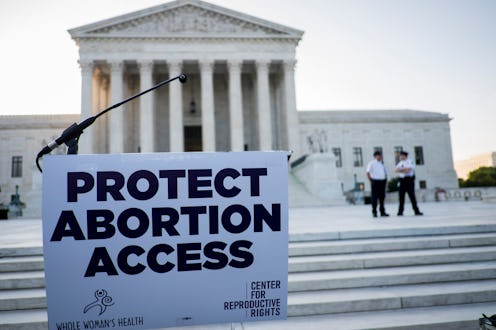Life
What Happens To Women In States With Only One Abortion Clinic

Abortion is a constitutionally protected medical procedure in the United States of America. Despite that fact, there are a growing number of restrictions to access to abortion across the country. And in seven states — Kentucky, Mississippi, West Virginia, Missouri, North Dakota, South Dakota, and Wyoming — one of those restrictions is the fact that there is only one abortion clinic. Anti-abortion activists consider this a win, but what’s the reality for women on the ground? What happens to women when their state has only one abortion clinic? “Women deserve access to abortion no matter where they live in the country,” Hillary Schneller, staff attorney for the Center for Reproductive Rights tells Bustle. “States that have one clinic are clearly not meeting that basic need.”
In 1992, Justice Sandra Day O’Connor wrote in the decision for Planned Parenthood v. Casey that states couldn’t impose an “undue burden” on women seeking abortion. But starting in 2010, states across the country have seen stricter and stricter rules about who can provide an abortion, when women can get abortions, and even how much time they have to wait before getting an abortion. These rules, combined with the lower rate of unplanned pregnancy in the past few years, have led to abortion clinics shuttering their doors across the country.
Which brings us back to those seven states, each with one brave clinic holding down the fort for reproductive rights. (And in Kentucky, that final clinic is suing to stay open, after their anti-choice governor set his sights on closing it down.) Here are five things that happen to women when a state has only one abortion clinic.
1They Have To Travel Unreasonable Distances For Care
One of the biggest burdens having only one abortion clinic puts on women who are seeking to end a pregnancy is that they have to travel far distances to get to the clinic. According to a 2013 analysis by The Daily Beast, around 400,000 women of reproductive age live more than 150 miles away from the closest abortion clinic. In Missouri, one in 10 clients of Planned Parenthood of the St. Louis region and Southwest Missouri travels more than 300 miles to get to the clinic.
“Traveling to a clinic presents a number of different barriers, including saving the money for that travel, taking additional time off work, finding childcare for the time it takes to travel to the clinic and travel back,” Schneller says.
2The Risk Of Complications Is Higher
When women face unreasonable barriers to safe and legal abortion — including the barrier of there being only one clinic in their state — the risk of complications with the pregnancy and with the abortion gets higher.
“Having to arrange for travel, plus finding the right appointment day leads to delays,” Schneller says. “And, as we know, abortion is safe throughout pregnancy but the longer you delay, it’s more likely a complication could arise.”
3They Have To Spend More Money
In addition to the cost of the abortion if the woman doesn’t have insurance or her insurance doesn’t cover it, women in states with only one clinic have a host of other costs to take into consideration. In an interview in Cosmopolitan, Mary Kogut, the vice president of patient services at Planned Parenthood of the St. Louis region and Southwest Missouri, outlined some of those costs, saying:
"They have to rearrange for their child care, their transportation, their jobs, the hours they are working. They may not have any sick leave or hours they can take for vacation, so it might be unpaid, and then they have to come back again 72 hours later, or greater than that, depending on their schedule, for their procedure.”
4Some Women Travel To Other States
If a state has only one clinic, some women may choose to travel to other states either because the closest clinic isn’t in their home state or because the specific abortion service they need isn’t available at the one clinic. One study from April 2017 by the Guttmacher Institute found that not only does traveling to a different state for an abortion cost more money, but it also might “cost” more emotionally.
“I feel like it's just really nerve-racking. … It just makes you feel like you're doing something bad,” one pregnant 22-year-old said in the study. “You know, like you're going out of state because where you live doesn't allow it. It just makes you feel kind of guilty for no reason.”
5There’s A Higher Chance Of Mental Health Damage
One anti-choice victory in recent years is the requirement in nine states that women be warned of the supposed potential long-term mental health risks of getting an abortion. However, a 2016 study by researchers at the University of California San Francisco that included almost 1,000 women recruited from abortion clinics in 21 states found that “no evidence that abortion causes mental health harm.”
However, the same study found that being denied an abortion did have a negative effect on women’s mental health. Women reported “significantly more anxiety symptoms and lower self-esteem and life satisfaction” eight days after being denied service, when compared with women who received an abortion. The rates of depression were the same between the two groups.
Abortion is one of the safest medical procedures a woman can have, and it’s protected by the highest court in the land. But, as we see here, access to abortion is not equal for American women. The lone clinics standing up for reproductive rights in those states are outposts of hope for the women they serve. Here’s to hoping they’re joined by others soon and the weight of some of that undue burden can be lifted.